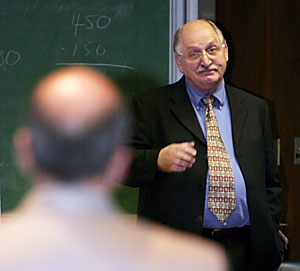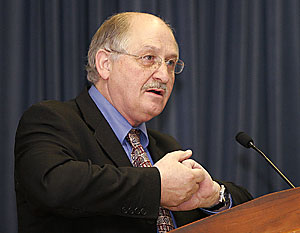 |
|
EVAN CARAVELLI/Arizona Daily Wildcat
|
State House Rep. Ted Downing (D-Ariz.) speaks to the faculty senate yesterday in Duval Auditorium at University Medical Center. Downing said increased state funding was unlikely.
|
|
|
By Natasha Bhuyan
Arizona Daily Wildcat
Tueday, December 7, 2004
Print this
The university needs to change its strategy when approaching the state legislature next month, because the change in members of the state legislature might mean funding will not be as favorable as anticipated, state legislature members told UA faculty yesterday.
State House Rep. Ted Downing (D-Ariz.), a UA research professor of social development, and State Sen. Toni Hellon (R-Tucson) spoke at yesterday's Faculty Senate meeting about the upcoming legislative session and told faculty members to take a proactive approach in order to acquire the most funding.
"It's a little bit tougher this time," Hellon said. "It's a little more conservative."
Arizona will not see the extra funds the state had anticipated, and a proportion of state funding for higher education will drop, Downing said.
To combat the problem, Hellon said higher education stakeholders should show unity in their mission, but maintain individual stories and voices, which are most powerful in the legislature.
Hellon added even if the state did see extra funds, faculty members should be aware there are other constituency groups fighting for the money. If Arizona universities and community colleges show they are a strong entity, they are more likely to get funds, Hellon said.
By collaborating on higher education initiatives with other universities, Downing said university systems are heading in the right direction, but can do more.
Downing mentioned a tri-university water initiative between the three state universities was prompted by Gov. Janet Napolitano to address Arizona's drought problem. He said universities should instigate similar collaborative initiatives instead of relying on the state to tell them what to do.
Hellon also said since many state legislative members may not appreciate higher education, it will be important to demonstrate what the university contributes to the state overall.
"The reality is, two-thirds of legislators do not have college degrees," Hellon said. "Find things they care about and talk at their level."
Concerns Downing has heard by other legislative members regarding higher education faculty were, "They don't communicate with us," "Do they really teach?" and, "They can't all be curing cancer."
Greg Fahey, associate vice president of governmental relations, said the UA tries to interact with the legislature through events like Legislature Day and Wildcat Pride Night in February, where community members travel to Phoenix to talk with legislators and set up a research fair.
"Try to show what we do at the university in little pieces - that is of great value to the state," Fahey said.
Provost George Davis brought up the issue of brain drain, a term coined for the problem of prominent faculty members leaving the university.
Davis said although the university is enthusiastic about recruiting and retaining faculty, the potential of what the university has to offer may not be understood by the legislature.
But Downing said the method of trying to get faculty salary increases by arguing brain drain is ineffective.
Though the university has lost several faculty members in the past, Downing said brain drain is not demonstrated by just the loss of a few, esteemed faculty members.
Downing said the UA's approach can be equated to getting a superstar quarterback instead of five new players on the field.
Still, UA faculty salaries are in the bottom 20th percentile of the nation and it would take $135.8 million to be on par with other universities.
 |
|
EVAN CARAVELLI/Arizona Daily Wildcat
|
State House Rep. Ted Downing responds to a question from Provost George Davis at yesterday's faculty senate. Davis questioned why the legislature did not share the UA's enthusiasm for recruiting prominent faculty members.
|
|
|
In other business, Faculty Senate approved a revised Public Art Funding Pool Policy at yesterday's meeting, which will add two students to the UA Public Art Advisory committee and change the allocation of art funding.
Charles Guerin, chair of the UA Public Art Advisory Committee, said with the approval of Faculty Senate, two students would be appointed to the committee next semester, one undergraduate and graduate. No students are currently on the committee, which must approve all public art on campus.
"They can provide a perspective of what's interesting to students on the university campus - that's something that's very valuable," said Mark Novak, a landscape architect from Campus and Facilities Planning who sits on the committee.
The revised Public Art Funding Pool Policy will allow the committee to pool resources for public art, with funding coming from different building projects instead of individual projects.
Public art funds are generated by building contracts, with half a percent of construction costs. However, Guerin said with small building projects, the funding ends up at about $20,000 to $30,000, which is not enough for significant works of public art.
"We were not getting much (art) for our money," Guerin said. "We were getting really small, interesting things, but not really extraordinary things."
Under the new policy, public art, which ranges from a few thousand to hundreds of thousands of dollars, can be purchased and placed at open spaces on campus, where more faculty, students, and visitors may enjoy them, Novak said.
The UA Public Art Advisory Committee has eight members, including representatives from Facilities Design and Construction, the School of Fine Arts, Campus and Facilities Planning, the Museum of Art, the College of Architecture and Landscape Architecture, and local community members.
Faculty Senate will vote for a Patriot Act Resolution drafted by the Committee of Eleven via e-mail in hopes of garnering university support to assist legislators and executive leaders in ensuring students' rights are not violated.
The resolution states although there is a need to limit the threat of further terrorist acts within the country, some of the government's actions under the Patriot Act may harm the fundamental education and research missions of the university.
The Committee of Eleven resolution calls on the UA community to ensure governmental actions do not erode students' and faculty members' fundamental rights.
Cornelius Steelink, a professor emeritus of chemistry who researched the Patriot Act, said, at Drake University last February, the government asked for the records of students who attended an anti-war forum, but has since withdrawn the subpoena.
Steelink said universities are vulnerable as the Patriot act allows federal access to students' personal, financial, medical, and e-mail records.
UA President Peter Likins said he supports the resolution, as it is part of a national movement among universities to express their concerns to the federal government.
